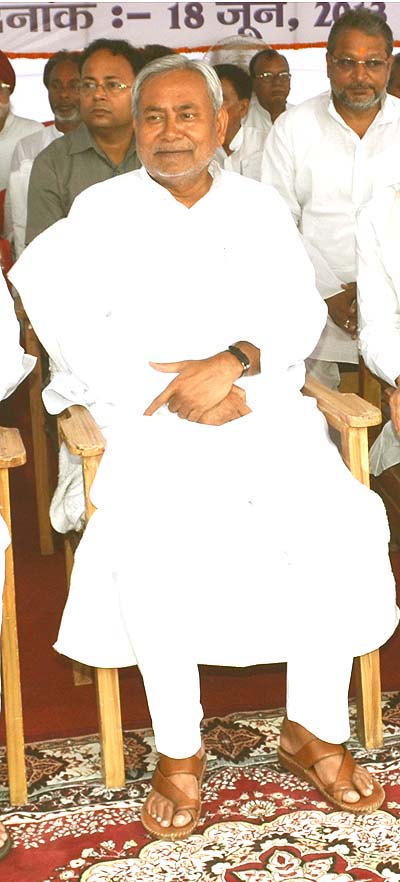 The ease with which Nitish Kumar won the trust vote in the assembly after the break-up of the alliance between his party, the Janata Dal-United (JD-U), and the Bharatiya Janata Dal (BJP), hides the complexities inherent in the evolving political scene. Even if the complications manifest themselves mainly in Bihar, their effects are bound to be felt with equal force at the centre. The ease with which Nitish Kumar won the trust vote in the assembly after the break-up of the alliance between his party, the Janata Dal-United (JD-U), and the Bharatiya Janata Dal (BJP), hides the complexities inherent in the evolving political scene. Even if the complications manifest themselves mainly in Bihar, their effects are bound to be felt with equal force at the centre.
The first and foremost of these is the chief minister's emergence as a major player at the national level. Ironically, Nitish Kumar will be pitted against another chief minister, Narendra Modi, who is also slated to play a crucial role at the centre in the coming weeks and months. However, while Modi will have the advantage of being associated with an established political formation, the National Democratic Alliance (NDA), led by his BJP, Nitish Kumar will be virtually on his own.
It is worth noting that this is the first time in his career that he will be a lone player. Earlier, as a participant in Jayaprakash Narayan's and V.P. Singh's anti-Congress movements, Nitish Kumar played a secondary role, first, to Lalu Prasad Yadav (till 1994) and then to George Fernandes. Subsequently, as a minister at the centre, he functioned first under the aegis of V.P. Singh and then under Atal Bihari Vajpayee.
Nitish Kumar acquired the No.1 status in Bihar only after the end in 2005 of Lalu Prasad's 15 years of dominance of the state and on becoming chief minister in 2005 and again in 2010. Now, if he has to make the transition to the national level, he has to play his cards with exceptional care.
The circumspection is warranted by several factors. For a start, he doesn't have an ally at the centre. Although the Congress supported the trust motion in the assembly, it must be calculating the pros and cons of siding with Nitish Kumar at the expense of an old friend like Lalu Prasad, whose Rashtriya Janata Dal (RJD) remains a formidable force in Bihar with 19 per cent of the vote share (against the JD-U's 22 per cent) and with considerable influence over the OBCs, especially the Yadavs, as well as Muslims.
Since Nitish Kumar and Lalu Prasad have been mortal enemies for the last two decades, there is no question of bringing them together on a "secular", anti-BJP platform along with the Congress. Had the latter not been a marginal force in Bihar, apart from being unstable at the centre, it might have been able to play a mediatory role on the grounds that a split in the "secular" camp would help the BJP. But the Congress is not in a position at the moment to persuade Nitish Kumar and Lalu Prasad to relive their days of camaraderie of the 1990s.
More than Lalu Prasad, it is Nitish Kumar who needs a helping hand - and not only in terms of monetary assistance from Delhi which cannot but raise howls of protests from the BJP and others on the grounds of partiality.
If the Congress is unable to choose between Nitish Kumar and Lalu Prasad, the JD-U leader may have no option but to try his luck with the so-called Third (or Federal or Eastern) Front. However, this perpetually inchoate conglomeration is currently more of a will o' the wisp than ever before.
Even more than the cut-and-paste job which Prakash Karat of the Communist Party of India-Marxist (CPI-M) tried while setting up a front in 2008, the present group of non-Congress and non-BJP parties is riven by contradictions. Just as there was little chance of Mayawati, favoured by the Left, and Jayalalitha getting along famously in 2008, the chances of bringing together Mayawati and Mulayam Singh Yadav, or Mamata Banerjee and the Marxists, are nil. Nor is there much possibility of Naveen Patnaik, Chandrababu Naidu, H.D. Deve Gowda and others playing an inspirational role in forming the front.
Arguably, if these regional parties are able to secure, say, 200-plus Lok Sabha seats, an effort may be made to cobble together an alliance. Even then, the mutual antipathies and ego hassles are bound to come in the way. It is only the Congress or the BJP which will have to be the nucleus of a new formation.
This is where Nitish Kumar will have to take calibrated steps. Having broken with the BJP, the chances of his gravitating towards the Congress are high. Much will depend, however, on how the JD-U fares in the parliamentary polls in Bihar. If it can hold its own vis-a-vis the BJP and the RJD, his stock will be high. Otherwise, he will be in for a long haul. As always, in politics or elsewhere, it is the winner who takes all.
|
